Amenities trending
This is a special feature from PAX International's April World Travel Catering and Onboard Services Hamburg 2020 edition.
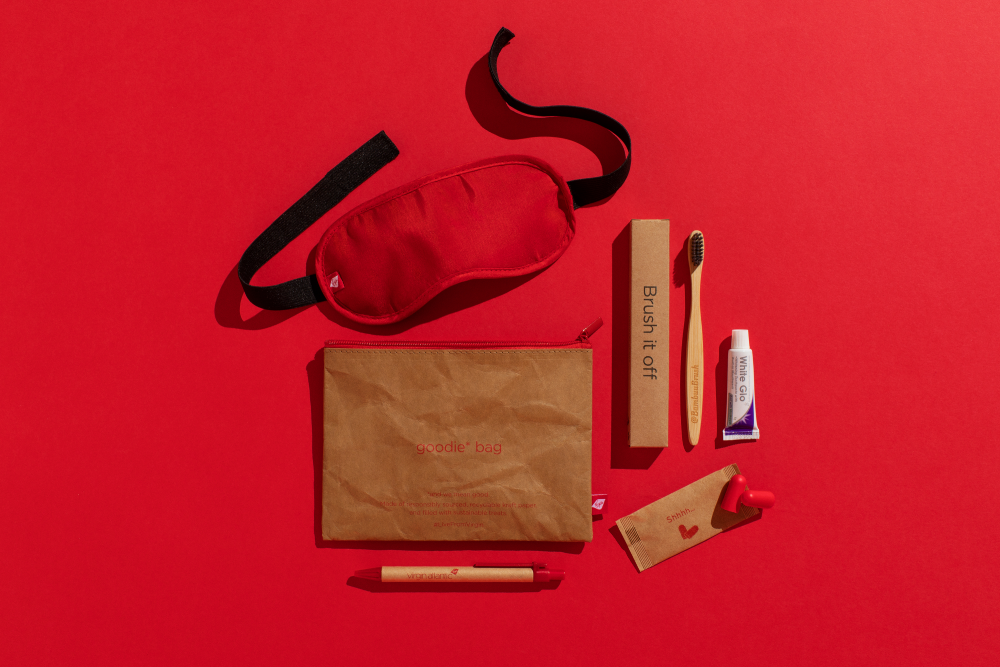
Virgin Atlantic kits by Galileo Watermark are designed to reduce single-use plastic and are made with fully recyclable FC craft paper
As I reflect on the developments of the last 12 months, I realize that it is already 10 years since the debut of the TravelPlus Airline Amenity Awards in celebration of the creation and design of onboard amenity kits. It is with pride that I feel TravelPlus has elevated the market perspective on amenity kits. It starts a conversation about the future of passenger’s travel needs.
Ten years ago, the amenity kit was rarely celebrated, yet today we see kits featured in magazines, trade publications and online travel outlets. It is not uncommon for an airline to hold a fully publicized event to launch a new brand partnership in their onboard amenities. We have also witnessed the introduction of new awards, proving a thirst to reward the passion and detail in amenity kit development.
Last year, the airline business environment deteriorated between rising fuel prices and a weakening of world trade. It is worth noting that last year was also the 10th consecutive year in the black for the airline industry which is certainly something to be celebrated. Even still, stiff competition between airlines for passenger numbers has kept overall yields low, and it is now expected that the effect of coronavirus will compound the already fragile situation.
As I write, it appears that uncertainty has already claimed the first small airline, with predictions of more to follow. That said, I believe that the international airline industry will bounce back, and passengers will continue to fly for business and leisure. A global economy relies on the transport of people and product, so airlines will need to develop and offer passengers added value in the shape on amenity kits.
Having spent the past six weeks with focus groups judging the entries into the 2019 TravelPlus Airline Amenity Awards it is very clear that budgets are being stretched to the maximum.

Simon Ward, Founder, TravelPlus
The First Class airline amenity kit is still king of the brands. Many airlines are partnering with a bag brand and using a different brand for the cosmetics contained within. For example, the Swiss International Airlines’ female amenity bag is designed by Bally while cosmetics are by La Prairie. Saudi Arabian Airlines have Missoni branded bags with Sprekenhus cosmetics. In general, First Class kits continue to represent a gift to the most valued – and valuable – customer. They have larger cosmetics and gifts for passengers. They are about airline’s saying “thank you” rather than focusing on usability.
Singapore Airlines leads the way in this regard. Its exclusive range of Lalique branded kits in collaboration with FORMIA are specifically designed for after flight. The womens’ bag is a jewelry box and the mens’ kit is a washbag. All Singapore Airlines First Class kits contain a Lalique scented candle as a gift and reminder of the voyage.
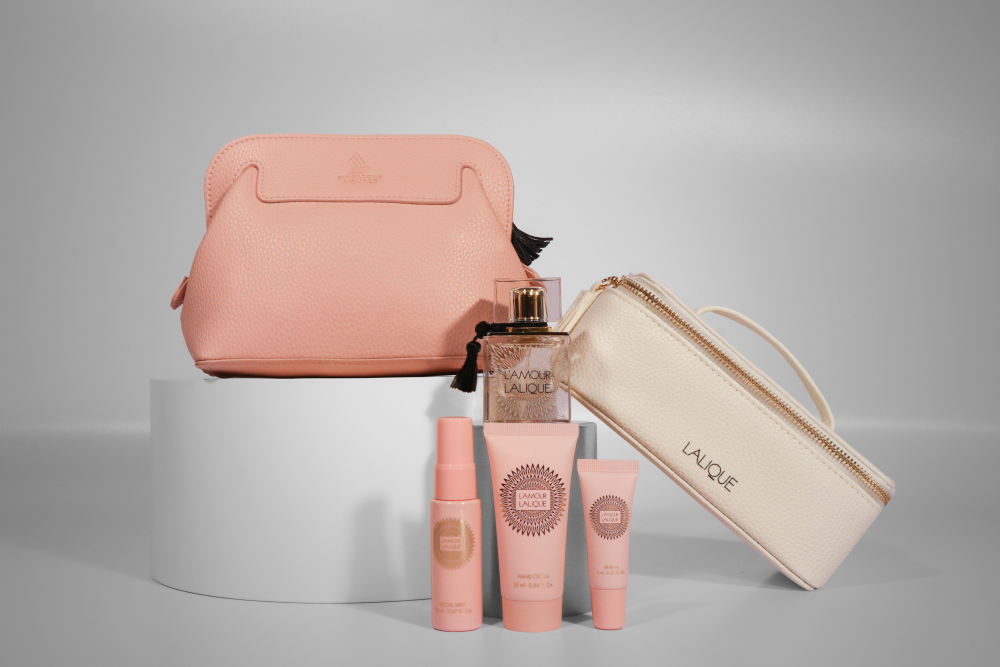
Singapore Airlines exclusive range of Lalique branded kits in collaboration with FORMIA are specfically designed for use after flight
Looking at Business Class amenity kits, airlines are embracing both color and design. More are working with brands and concepts close to home. Icelandair’s recent range of amenity kits, in partnership with WESSCO International, are inspired by the dramatic natural habitat and animals of the region, including the arctic fox, glacial parks and puffins. The kits also include a range of skincare products well-known Icelandic cosmetic company Hannes Dottir.
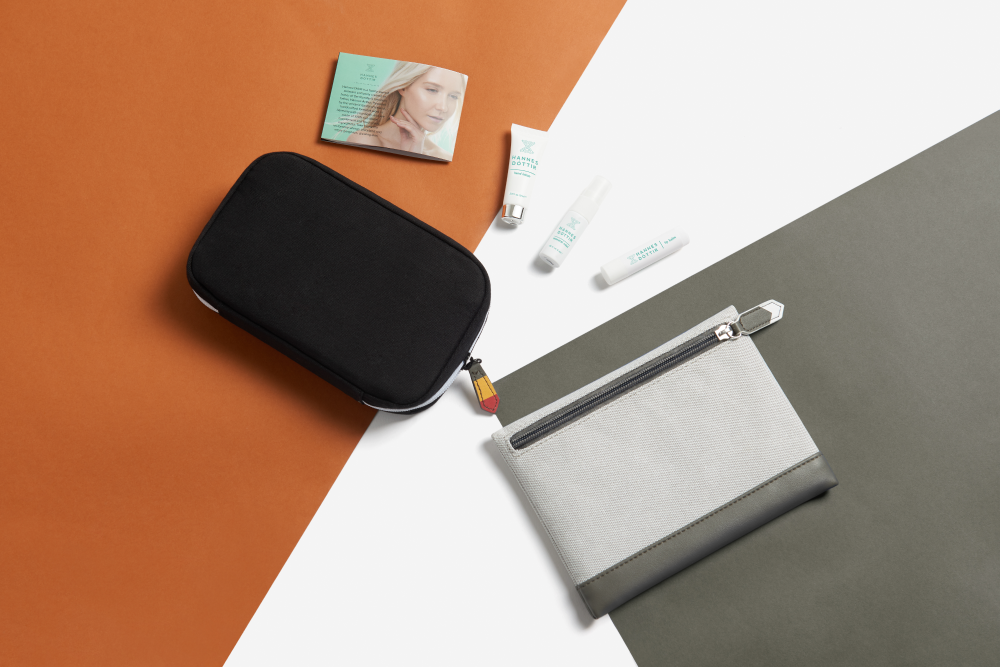
Icelandair's range of amenity kits, in partnership with WESSCO International, are inspired by the region's natural habitat and folklore. They feature skincare products by Icelandic cosmetic company Hannes Dottir
Business Class kit creators are embracing innovative design, such as Lufthansa’s biker’s bags and doctor’s kits. The biker’s bag features buckles and is distributed on outbound routes, with the doctor's kit given to passengers on inbound flights. Both kits are available in cognac and dark leather look materials. Passengers receive a collectible item from their travels and the airline is able to experiment with different designs.
While branded cosmetics are found in most kits in this class, it is really only Middle East airlines that concentrate on branded bags. Beyond this, only a few airlines are extending the brands to the bags themselves, with Turkish Airlines collaborating with Versace, KLM with Jan Taminiau, and Finnair continuing its long-established brand partnership with Marimekko.
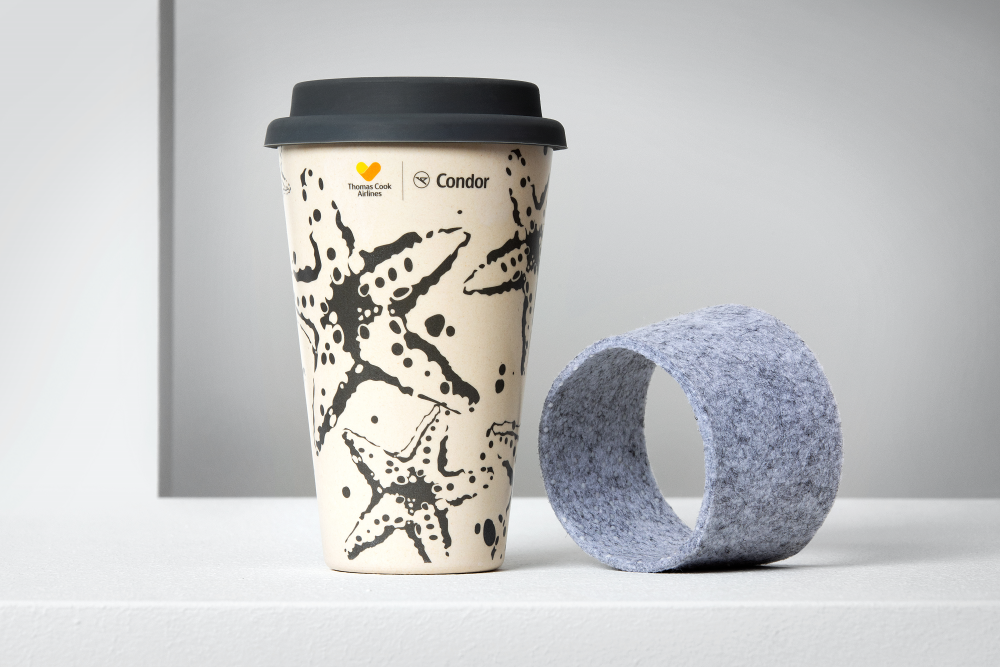
This reusable travel mug with lid and PET recycled sleeve from skysupply is part of Condor's efforts to embrace sustainability in its onboard amenity offerings
European airlines have truly begun to embrace sustainability, with more than 30 percent of kits in this year’s awards containing items made from bamboo or psm corn material, most of which come in recyclable packaging. Premium Economy kit suppliers are pushing boundaries. This can be seen in Condor’s recent offerings created with Skysupply that provides a reusable travel mug made from eco-friendly bamboo fiber, with a Silicon lid and a PET recycled sleeve to protect from heat.
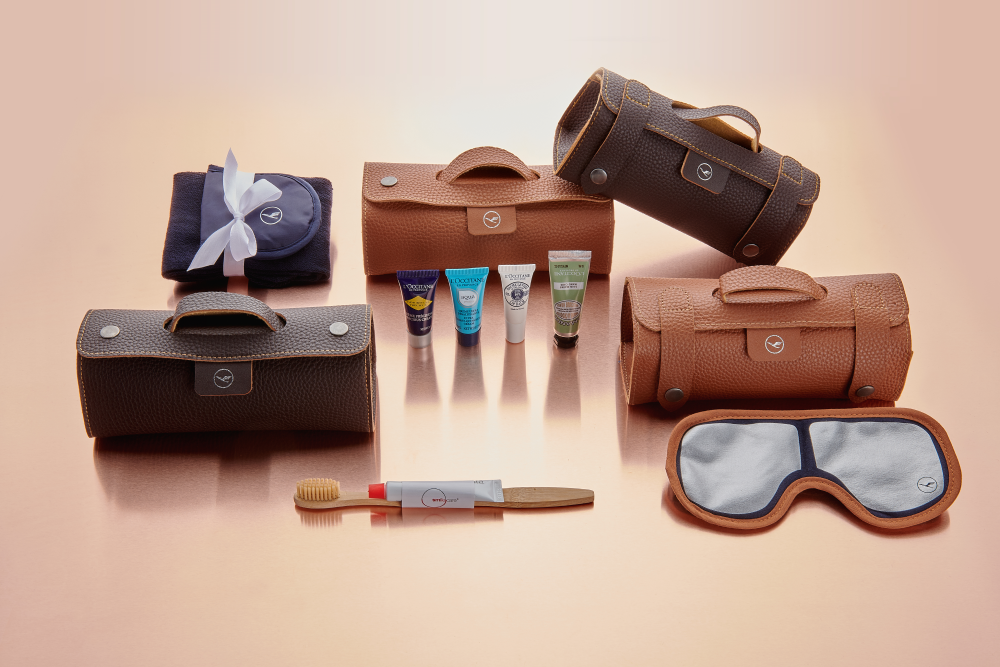
The biker's bag kit for Lufthansa features buckles and is distributed on outbound routes
Also seen is the inclusion of bamboo toothbrushes, reduced plastic packaging and more sustainable fabrics. Virgin Atlantic kits by Galileo Watermark are designed to reduce single-use plastic with the bags made of responsibly sourced and fully recyclable FC craft paper. The comfort items are selected without using plastic packaging and includes a BambuuBrush toothbrush, 2-in-1 White Glo toothpaste and mouthwash, ear plugs and a paper pen.
Generally speaking, there appears to be very little difference between Economy and Premium Economy kits. Indeed, in design, content and form, the kits are similar. Last year saw Saudi Arabian Airlines introduce a collection aimed at sharing the distinct colors and patterns unique to each Saudi region, drawing on architecture and heritage. They are created in an eco-friendly manner, using recycled materials in both content and packaging, and designed as a collector’s series adding a distinctive slant in Economy kits.
In summary, it is clear that we are seeing more standardization of content across all classes. Despite the hype around sustainability, it is disappointing to see more than 80 percent of kits submitted to the awards still contain plastic items: combs, toothbrushes and packaging. So, as designers and suppliers sourcing alternative sustainable products, airlines still seem reluctant to include them. This is likely due to the price point of such items as sustainability is not a cheap option. But, due to economy of scale, the more airlines to adopt sustainable products, the cheaper the items will become.
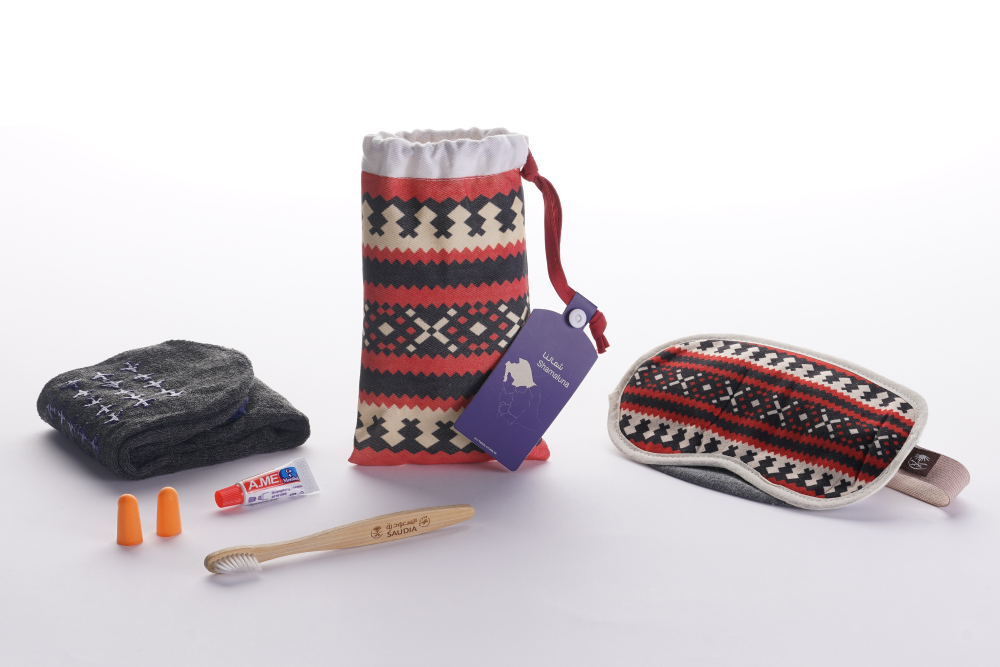
SAUDIA introduced collectible kits with distinct colors and patterns inspired by the region's architecture and heritage
Few airlines have included any new product types, but, lens cloths, nail files and makeup remover pads have been incorporated. In the next 12 months, I hope more airlines will consider including practical items rather than the standard plastic 2-in-1 foldable comb or sample-size cosmetics, replacing with larger sizes that can be used more than once.
The onboard amenity market is buoyant with emerging cosmetic and fashion brands keen to join and gain access to a large audience of affluent potential customers. But, a word of caution: the brand does not always give the intended added value to an amenity kit, as misaligned brands are often a turn-off for passengers. As a result, we are seeing some airlines shift to non-branded bags, or branding the bags with the airline logo. Such is the case with Air France, which has a long heritage of gifting passenger’s high-quality kits across all classes that truly reflect its brand rather than any third party.
It is clear from the feedback received from this year’s judges; passengers still love to receive a kit during travel. Although the style, design and content may move with trends, if it meets passenger demand, the cherished amenity kit will be with us for a long time yet.
Albéa Travel Designer’s amenity kit mania
By Jane Hobson
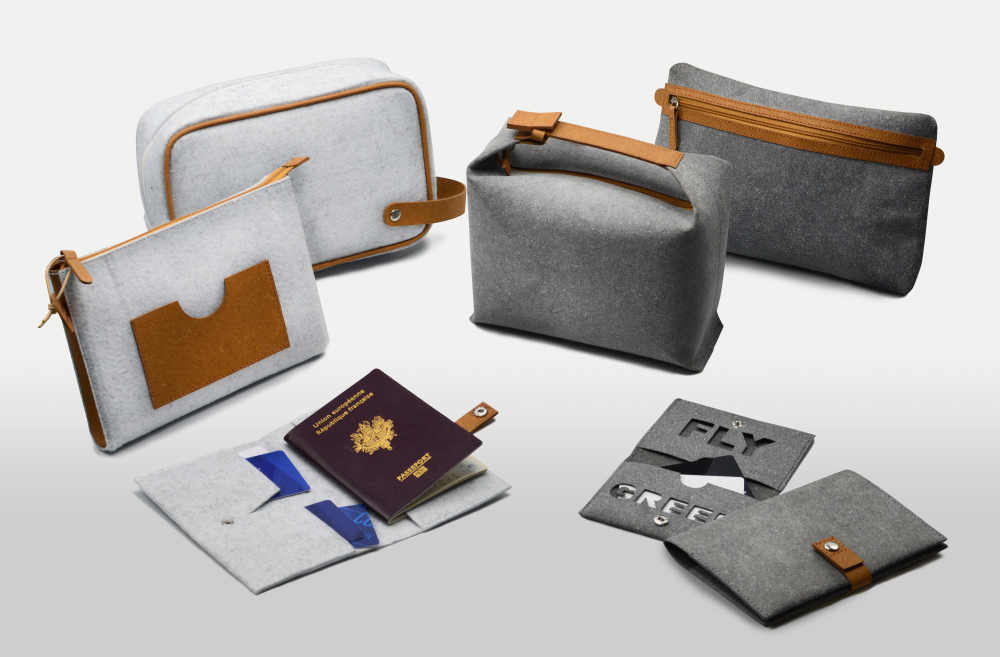
Albea Travel Designer's Fly Green amenity kit collection uses recyclable, recycled or bio-based materials to show that sustainable options are stylish and price effective
Last year held many accomplishments for Albéa Travel Designer. It tapped France-based beauty company Melvita for a new Aircalin kit featuring the brand’s hand cream, face cream and lip balm. Albéa and Aircalin renewed its contract for one year with a new skincare partnership that will be disclosed this summer.
The designer also released a number of kits for its long-time partner Air France; a pouch for all La Première, Business, Premium Economy and Economy passengers on long-haul flights with Carita cosmetics; it brought back the “You & Me” kit for Business passengers in updated colors featuring Clarins cosmetics; it debuted a new infant comfort pouch with Mustela baby beauty products and a diaper; and, it updated the airline’s Premium Economy kit. Most recently, Albéa delivered a refreshed two-tone padded texture kit for long-haul Premium Economy passengers and a leather case with face and body treatments by Carita for the La Première cabin. Albéa and Air France have been working together for more than 15 years.
In the year ahead, Albéa will have a “strong” focus on sustainability, Marketing and Brand Partnership Manager Maxime Ridoux tells PAX International. The company will launch the “Fly Green” collection of bags, accessories, amenities and cosmetics. “Those collections will show that a great diversity of materials, recyclable, recycled or bio-based, can be stylish and price effective,” Ridoux says.
The Group was the first packaging provider to sign the New Plastics Economy Global Commitment launched by the Ellen MacArthur Foundation. By joining, Albéa agrees to make 100 percent of plastic packaging reusable, set a recycled content target of 10 percent across all plastic packaging used, eliminate unnecessary plastic packaging and move towards reuse models where relevant, all by 2025.
The company is already making strides toward these ambitious goals, linking up with Colgate for its first ever fully recyclable toothpaste tube and the first carton base tube for L’Oréal, as well as joining L’Oréal’s SPICE (the Sustainable Packaging Initiative for CosmEtics).

